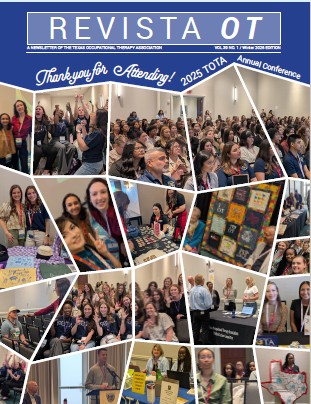- About Us
- Membership
- Districts
- Conference
- Education
- Advocacy
- Students
- TOTA Online Learning
|
What is Occupational Therapy (OT)? Definition of Occupational Therapy Practice for the AOTA Model Practice Act What Do Occupational Therapy Practitioners Do?Occupational therapists and occupational therapy assistants help people participate in their desired occupations with the therapeutic use of everyday activities, based on the client's personal interests and needs. Occupational therapy (OT) considers the complex relationship between the client, the activity, and the environment in which the activity takes place. Examples of OT interventions include:
What do occupational therapy services include? Services focus on the client's goals and typically include:
OT services may also include comprehensive evaluations of the client’s home and other environments (e.g., workplace, school), recommendations for adaptive equipment and training in its use, and guidance and education for family members and caregivers.
|


